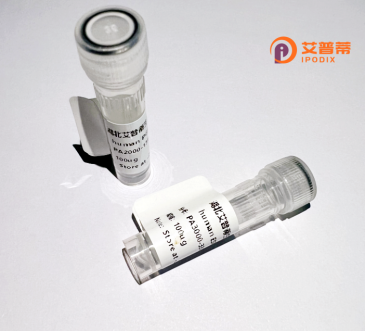
| 纯度 | >90%SDS-PAGE. |
| 种属 | Human |
| 靶点 | CARD10 |
| Uniprot No | Q9BWT7 |
| 内毒素 | < 0.01EU/μg |
| 表达宿主 | E.coli |
| 表达区间 | 1-1032aa |
| 氨基酸序列 | MPGRAEAGEAEEEAGAGSGSEAEEDALWERIEGVRHRLARALNPAKLTPYLRQCRVIDEQDEEEVLSTYRFPCRVNRTGRLMDILRCRGKRGYEAFLEALEFYYPEHFTLLTGQEPAQRCSMILDEEGPEGLTQFLMTEVRRLREARKSQLQREQQLQARGRVLEEERAGLEQRLRDQQQAQERCQRLREDWEAGSLELLRLKDENYMIAMRLAQLSEEKNSAVLRSRDLQLAVDQLKLKVSRLEEECALLRRARGPPPGAEEKEKEKEKEKEPDNVDLVSELRAENQRLTASLRELQEGLQQEASRPGAPGSERILLDILEHDWREAQDSRQELCQKLHAVQGELQWAEELRDQYLQEMEDLRLKHRTLQKDCDLYKHRMATVLAQLEEIEKERDQAIQSRDRIQLQYSQSLIEKDQYRKQVRGLEAERDELLTTLTSLEGTKALLEVQLQRAQGGTCLKACASSHSLCSNLSSTWSLSEFPSPLGGPEATGEAAVMGGPEPHNSEEATDSEKEINRLSILPFPPSAGSILRRQREEDPAPPKRSFSSMSDITGSVTLKPWSPGLSSSSSSDSVWPLGKPEGLLARGCGLDFLNRSLAIRVSGRSPPGGPEPQDKGPDGLSFYGDRWSGAVVRRVLSGPGSARMEPREQRVEAAGLEGACLEAEAQQRTLLWNQGSTLPSLMDSKACQSFHEALEAWAKGPGAEPFYIRANLTLPERADPHALCVKAQEILRLVDSAYKRRQEWFCTRVDPLTLRDLDRGTVPNYQRAQQLLEVQEKCLPSSRHRGPRSNLKKRALDQLRLVRPKPVGAPAGDSPDQLLLEPCAEPERSLRPYSLVRPLLVSALRPVVLLPECLAPRLIRNLLDLPSSRLDFQVCPAESLSGEELCPSSAPGAPKAQPATPGLGSRIRAIQESVGKKHCLLELGARGVRELVQNEIYPIVIHVEVTEKNVREVRGLLGRPGWRDSELLRQCRGSEQVLWGLPCSWVQVPAHEWGHAEELAKVVRGRILQEQARLVWVECGSSRGCPSSSEA |
| 分子量 | 115.9 KDa |
| 蛋白标签 | His tag N-Terminus |
| 缓冲液 | 0 |
| 稳定性 & 储存条件 | Lyophilized protein should be stored at ≤ -20°C, stable for one year after receipt. Reconstituted protein solution can be stored at 2-8°C for 2-7 days. Aliquots of reconstituted samples are stable at ≤ -20°C for 3 months. |
| 复溶 | Always centrifuge tubes before opening.Do not mix by vortex or pipetting. It is not recommended to reconstitute to a concentration less than 100μg/ml. Dissolve the lyophilized protein in distilled water. Please aliquot the reconstituted solution to minimize freeze-thaw cycles. |
以下是关于CARD10蛋白功能的3篇参考文献示例(注:以下内容为示例,实际文献需通过学术数据库检索确认):
---
1. **文献名称**:*CARD10 Promotes NF-κB Activation and Inflammatory Responses in Innate Immunity*
**作者**:Li, X. et al.
**摘要**:研究揭示CARD10通过激活NF-κB信号通路,在巨噬细胞中介导炎症因子的产生,敲除CARD10可抑制病原体诱导的炎症反应,表明其在先天免疫中的关键作用。
2. **文献名称**:*Oncogenic Mutations of CARD10 Drive Colorectal Cancer Progression*
**作者**:Wang, Y. et al.
**摘要**:发现结直肠癌中CARD10基因的突变导致其组成性激活,进而通过PI3K/AKT通路促进肿瘤细胞增殖和转移,提示CARD10可作为潜在治疗靶点。
3. **文献名称**:*CARD10 Regulates T Cell Receptor Signaling by Scaffolding BCL10-MALT1 Complex*
**作者**:Sato, T. et al.
**摘要**:阐明CARD10在T细胞中作为支架蛋白,促进BCL10-MALT1复合物形成,调控TCR信号传导及IL-2分泌,缺失CARD10会导致T细胞活化缺陷。
---
**注意**:以上为示例性摘要,具体研究请参考PubMed、Web of Science等数据库中的实际文献。如需真实文献,建议检索关键词“CARD10”、“BCL10 interaction”或“CARD10 cancer”。
CARD10 (Caspase Recruitment Domain-containing protein 10), also known as CARMA3. is a scaffold protein belonging to the membrane-associated guanylate kinase (MAGUK) family. It contains an N-terminal Caspase Recruitment Domain (CARD), a coiled-coil (CC) domain, a PDZ domain, and a SH3 domain, which mediate protein-protein interactions critical for signaling complex assembly. CARD10 is primarily expressed in non-hematopoietic tissues and plays a key role in regulating NF-κB and MAPK signaling pathways. It acts downstream of G protein-coupled receptors (GPCRs) and receptor tyrosine kinases (RTKs), linking receptor activation to inflammatory, proliferative, or survival responses. Dysregulation of CARD10 has been implicated in pathologies such as B-cell lymphoma, inflammatory bowel disease, and cancers (e.g., breast, lung), often due to mutations or aberrant activation causing excessive NF-κB-driven cell proliferation. Recombinant CARD10 protein is utilized to study its structural interactions, signaling mechanisms, and therapeutic targeting. Research focuses on its role in immune regulation, oncogenesis, and as a potential biomarker or drug target for inflammatory and malignant diseases. Its modular domains make it a central node in deciphering signal transduction networks involving immunity and cell fate decisions.
×